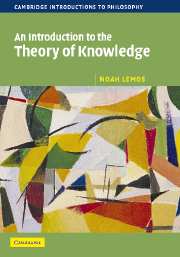Book contents
- Frontmatter
- Contents
- Preface
- 1 Knowledge, truth, and justification
- 2 The traditional analysis and the Gettier problem
- 3 Foundationalism
- 4 The coherence theory of justification
- 5 Reliabilism and virtue epistemology
- 6 Internalism, externalism, and epistemic circularity
- 7 Skepticism
- 8 The problem of the criterion
- 9 The a priori
- 10 Naturalized epistemology
- Select bibliography
- Index
3 - Foundationalism
- Frontmatter
- Contents
- Preface
- 1 Knowledge, truth, and justification
- 2 The traditional analysis and the Gettier problem
- 3 Foundationalism
- 4 The coherence theory of justification
- 5 Reliabilism and virtue epistemology
- 6 Internalism, externalism, and epistemic circularity
- 7 Skepticism
- 8 The problem of the criterion
- 9 The a priori
- 10 Naturalized epistemology
- Select bibliography
- Index
Summary
In the last two chapters, we have focused mainly on the concept of knowledge. In the next few chapters we shall be concerned primarily with epistemic justification. There are at least two reasons for considering theories about epistemic justification. First, even if a satisfactory and widely accepted solution to the Gettier problem remains elusive, many philosophers hold that there is some important connection between knowledge and justification. Many hold that knowledge requires justification, that S knows that p only if p is epistemically justified for S. Similarly, many hold that if S is justified in believing not-p, then S does not know that p. Since it is reasonable to think that there is some connection between knowledge and justification, a better understanding of the nature of justification will help us to understand better the nature of knowledge. Second, just as we are interested in the nature of knowledge, so too we may be interested in the nature of epistemic justification. We might simply be curious about what makes a belief justified or reasonable. Most of us believe that some beliefs are justified or reasonable and others aren't, but we may wonder what makes them so.
In this chapter we shall focus on foundationalism. In the first section, we shall lay out some of the main claims of foundationalism and examine the concept of a justified basic belief. We shall also consider the regress argument for the existence of justified basic beliefs.
- Type
- Chapter
- Information
- An Introduction to the Theory of Knowledge , pp. 44 - 65Publisher: Cambridge University PressPrint publication year: 2007



